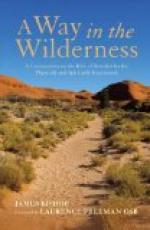Musquash knows well that when a young loon, or a shelldrake, or a black duck, is caught in the open like that, he always tries to get back where his mother hid him when she went away. That is what the poor little fellows were trying to do now, only to be driven back and kept moving wildly by the muskrat, who lifted himself now and then from the water, and wiggled his ugly jaws in anticipation of the feast. He had missed the eggs in his search; but young loon would be better, and more of it.—“There you are!” he snapped viciously, lunging at the nearest loon, which flashed under water and barely escaped.
I had started up to interfere, for I had grown fond of the little wild things whose growth I had watched from the beginning, when a great splashing began on my left, and I saw the old mother bird coming like a fury. She was half swimming, half flying, tearing over the water at a great pace, a foamy white wake behind her.—“Now, you little villain, take your medicine. It’s coming; it’s coming,” I cried excitedly, and dodged back to watch. But Musquash, intent on his evil doing (he has no need whatever to turn flesh-eater), kept on viciously after the exhausted little ones, paying no heed to his rear.
Twenty yards away the mother bird, to my great astonishment, flashed out of sight under water. What could it mean! But there was little time to wonder. Suddenly a catapult seemed to strike the muskrat from beneath and lift him clear from the water. With a tremendous rush and sputter Hukweem came out beneath him, her great pointed bill driven through to his spine. Little need of my help now. With another straight hard drive, this time at eye and brain, she flung him aside disdainfully and rushed to her shivering little ones, questioning, chiding, praising them, all in the same breath, fluttering and cackling low in an hysteric wave of tenderness. Then she swam twice around the dead muskrat and led her brood away from the place.
Perhaps it was to one of those same little ones that I owe a service for which I am more than grateful. It was in September, when I was at a lake ten miles away—the same lake into which a score of frolicking young loons gathered before moving south, and swam a race or two for my benefit. I was lost one day, hopelessly lost, in trying to make my way from a wild little lake where I had been fishing, to the large lake where my camp was. It was late afternoon. To avoid the long hard tramp down a river, up which I had come in the early morning, I attempted to cut across through unbroken forest without a compass. Traveling through a northern forest in summer is desperately hard work. The moss is ankle deep, the underbrush thick; fallen logs lie across each other in hopeless confusion, through and under and over which one must make his laborious way, stung and pestered by hordes of black flies and mosquitoes. So that, unless you have a strong instinct of direction, it is almost impossible to hold your course without a compass, or a bright sun, to guide you.




